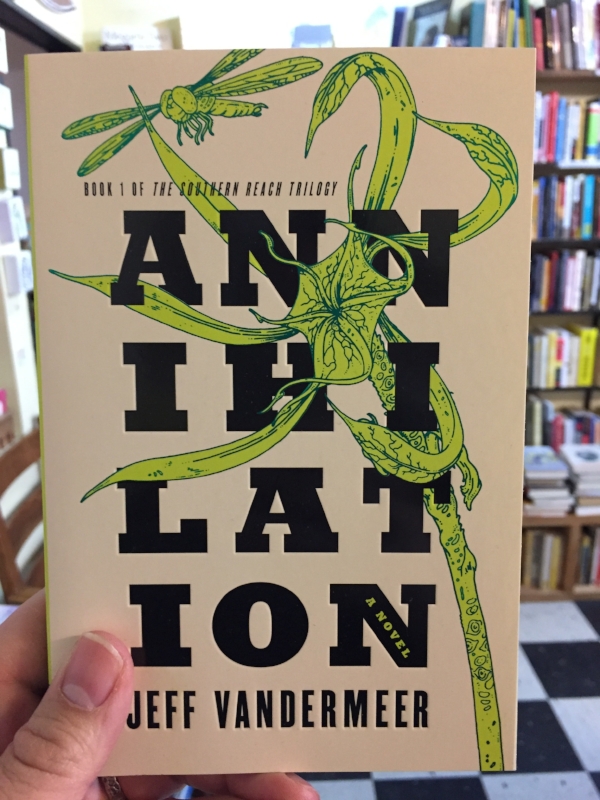I recently picked up John Steinbeck's classic Cannery Row and was pleasantly surprised by how fresh and finely wrought it is. This book is a gem, examining the lives of the downtrodden people living on Cannery Row in Monterey, California in the 1930s. Steinbeck paints his characters with humor and love, not sparing the bleakness of their lives yet including the small moments of beauty and joy that keep them going. Cannery Row is lighter than The Grapes of Wrath but also more precise, despite the apparently loose structure; while it's easy to get lost in the book, you can also put it down for a day or two in between chapters and come back to without losing a step. - Joe, owner and Cannery Row visitor
Best of the Backlist Book Review: Annihilation
Annihilation, by Jeff Vandermeer
Annihilation is an unusual science fiction novel, and it immediately seized my attention. I knew only a little about the story going in - somewhere along the southeast coast of the United States, a team of scientists enters the otherworldly Area X, seeking to understand what it is and how and why it has come to be. Strange events begin almost immediately, as the scientists wonder what is out there and how much the shadowy government agency that sent them already knows about it.
The story, simple in some ways and startlingly original in others, blends elements of weird fiction and psychological thriller, with amazing results. Our narrator, a biological researcher who focuses intensely on the object of her study, is not the warmest character, but I quickly and easily fell into her way of thinking. As the scientists unravel the secrets of Area X - and the biologist reveals her own secrets to the reader - they wonder to what extent they observe, or are the subject of observation.
Annihilation is the first in a series of three books: it works as its own story, but leaves plenty of loose ends, and I ordered the next two titles as soon as I was finished.
-Joe, bookshop & beard owner
Best of the Backlist Book Review: My Lady Jane
My Lady Jane
Authors: Cynthia Hand, Brodi Ashton, & Jodi Meadows (AKA The Lady Janies)
This first book, from a collection of books about (in)famous Janes, is a mix of humor and (mostly true) history as we follow King Edward VI, his cousin Lady Jane Grey, and Gifford (call him G) as they navigate the nuances of their kingdom after the death of King Henry VIII. However, The Lady Janies take this one step further in the most fantastical way - certain people in this world can shapeshift into animals! With this added element, The Lady Janies throw us into dissent, conspiracy, romance, friendships, and coming-of-age stories as we hope and pray that King Edward and Jane Grey have happier endings than the true, bleak ones history has already written.
I found myself jumping to research whether particular elements of the story were true or happened the way The Lady Janies wrote them. It’s a great jumping off point for research and has such an interesting writing style (sometimes the authors break the fourth wall to tell you exactly what is true and what is not) They also already have a second book published, My Plain Jane (Jane Eyre meets ghost hunting), and a third slated for for 2020 entitled My Calamity Jane, so keep on the lookout for those as well!
I giggled through the shenanigans in My Lady Jane and I would give this book 4 out of 5 Awesome Austin Points for pure hilarity mixed with an interesting take on alternate history.
In case you missed my first three reviews in this series, feel free to go back and check them out: Scythe by Neal Shusterman, The Serpent King by Jeff Zentner, and Three Dark Crowns by Kendare Blake. This is my #4 pick for my Top Five favorites from the 2018-2019 Gateway Readers Award Nominees. There’s information on the award here and the Top 15 books here.
-Austin
Best of the Backlist Book Review: Three Dark Crowns
Three Dark Crowns by Kendare Blake
“Three dark queens
are born in a glen,
sweet little triplets
will never be friends.
---
Three dark sisters
all fair to be seen,
two to devour
and one to be Queen.”
Three Dark Crowns by Kendare Blake is one of those books that slowly burns its way through you. I’ve read some negative comments regarding the romance plot lines (let’s be serious, it’s a YA novel so there’s bound to be at least one) and how “slow” this book moves while containing two dimensional main characters. I, however, disagree with these naysayers (maybe not so much about the romance) because this book is the perfect setup for a dark series. I felt many people were only disappointed by the reality of the book due to their expectations about what they thought the book should be. That doesn’t make a book bad though!
*shrug*
Three Dark Crowns fits the typical fantasy novel scheme of frontloading - this is where most people will become frustrated. If you want action and only action from the get go, then this book won’t be for you. We follow three sisters, the Queens, as they reach their sixteenth year. The three will battle until only one lives, becoming the next true Queen and restarting the cycle (she will have triplets, they will grow up and fight, one becomes Queen, repeat). To aid in these battles, each Queen has her own powers: one is a naturalist (controls plants and animals), one an elemental (controls earth, fire, water, and air), and one a poisoner (immune to poison, trained in poisons). The first part of the book sets up the whole process of each Queen as she mentally prepares to begin a year of battle and survival, which explains the slow start - it’s necessary to set up the Blake’s world.
More intriguing to me, though, is that the book isn’t only about the Queens in the long run; they are just figureheads for powerful families. While we mostly see the perspective of the Queens, the true story takes place with the families surrounding them. How have those families influenced each Queen’s upbringing? Why is Katharine so timid, Mirabella so angry, and Arsinoe so lacking in confidence? Like I said, this is a slow burning book, so we see the Queens slowly grow to realize their roles on the island and their manipulation by their “loving” families. Is their fate truly to kill one another?
Overall, I’d give this 5 out of 5 Awesome Austin Points and highly suggest reading the next book in the series (the third book was recently published on September 4, 2018 and a fourth slated for 2019 publication). If you like dark fantasy, political wars, and some unexpected twists and turns, then this is definitely the book for you! - Austin (Resident YA Expert)
[In case you missed my last reviews on Scythe by Neal Shusterman and The Serpent King by Jeff Zentner, this is Review #3 of my Top Five picks (in no particular order) from the 2018-2019 Gateway Readers Award Nominees. There’s information on the award here and the Top 15 books here. The committee always welcomes volunteer readers!]
Best of the Backlist Book Review: Scythe
Hey everyone, Austin here! Have you heard of the Gateway Award? If not, you should check it out. I have had the pleasure of volunteering as a Reader Selector for the award over the past few years in an attempt to expand my own reading tastes in the Young Adult reading world and, in the process, have encountered some truly amazing novels. My next reviews will be centered around my Top 5 favorites among the 2018-19 Gateway Award Nominees (they’re all pretty great though).Here’s the full list of 2018-19 Nominees if you’d like to explore them yourself!
Scythe is one of those books that, on the surface, seems incredibly dark and disturbing, yet throws you into a world of intrigue and moral dilemma - a future United States where disease and death have been eliminated due to advances in technology, and decisions for the entire world are made by an overarching technology called “The Thunderhead”. Readers follow Citra and Rowan as they are apprenticed to a group of people known as Scythes, trained in the art of killing and the history, value, and purpose of death. Scythes were created, outside of the Thunderhead, to “glean” individuals to prevent overpopulation, which causes them to be feared as well as revered as celebrities.
I do not want to explain too much of the plot, as I think it would be more fun to allow the chaos, beauty, and mystery of this book to unfold as you read. However, I want to expand upon my surprise at the depth this book created within my own psyche. I, honestly, read this book a year ago, but I still find myself thinking about two concepts Shusterman layered on top of each other as a foundation for his world - technology and death.
Shusterman created a world in which the Thunderhead is always watching, always computing, and always making the best choices for the entire world. Through this end, the world population has become accustomed to technology being a pervasive part of life. Need food? Ask the Thunderhead (it will give you food). Need a new friend? Ask the Thunderhead (it will pair you with someone analytically matched to meet your current needs). Need to be healed? Just change the frequencies of the nanobots living inside you and the Thunderhead will take care of the rest. The whole concept is incredibly “Big Brother”-ish yet the world agrees to, and seems unaffected by, complete control of the Thunderhead.
However, the concept of the Thunderhead leaves me with more questions than answers as I ponder the rise in our current technologies. Our iPhones and other devices are constantly tracking and gathering data on us to provide optimal user experiences. What happens if we give over complete control so the devices are always making our decisions for us? What would that world look like? Would it actually lead to a utopia or would the world be led into chaos? Shusterman weaves his conjectures through Scythe in an impressive feat of world building and has left me pondering the role of technology in our current existence.
Using the Thunderhead as a base, Shusterman expands his narrative around death, but I would argue that he’s actually writing about life. The Scythes are trained to kill (excuse me, glean) but the more important conversations arise when talking about how people choose to live within this world of immortality. Citra and Rowan struggle with this in very different ways, yet they both have to reach their own conclusions regarding how they choose who to glean from the world. Should they glean the oldest? Should they glean the least “successful” individuals, or should they only glean the willing? These conversations might seem disturbing, yet Shusterman builds his world so they come naturally and without shying away from the dissonance they create within his characters.
I truly loved this book (5 out of 5 Awesome Austin Points) - Shusterman’s world building and character development are phenomenal and I found myself disappointed knowing the series wasn’t yet finished and I had to wait. Ugh. However, since last year, I have read the second book in the series, The Thunderhead (January 2018). And, though such a thing is rare, I would argue it is a sequel that outshone its predecessor. I am looking forward to the third (and hopefully final) book, entitled The Toll. It is slated for publication in 2019.
- The Bookish Austin
Best of the Backlist Book Review: The Storied Life of A.J. Fikry
Review of The Storied Life of A.J. Fikry by Joe, owner of Yellow Dog Bookshop.
This book was sad and funny, heartbreaking and hopeful; it starts out as a light read but develops into a deep story.
Gabrielle Zevin tells the story of A.J., the lonely, widowed, curmudgeonly owner of Island Books, and Amelia, an ambitious publisher rep who is determined to sell him a load of books. A valuable book disappears, an infant is left in the shop, and A.J. and Amelia find their lives completely transformed.
Each section of the book begins with an epigraph from a short story, which we eventually learn are the stories chosen by A.J. for Maya, the baby he raised in the bookshop. As the book draws to its tearful yet triumphant close, you will find yourself wanting to read it all over again. Even if you’re not a bookstore owner like me, this story will touch you deeply and, I hope, encourage you to pass on your own love of books to others.
When Breath Becomes Air
When Breath Becomes Air by Paul Kalanithi
So there’s a new book you may have heard about: When Breath Becomes Air, by the late Paul Kalanithi, a neurosurgeon who died of lung cancer last March. In the last year of his life he published several essays on facing cancer, the irony of being a doctor with a terminal illness, and the sadness of not being able to see his daughter grow up. And Paul worked on a book, shepherded to completion and publication by his wife Lucy. But I don’t think of him as Paul – I think of him as Pubby (his nickname). Because that’s how he was introduced to me twenty years ago.
Pubby and I had a lot of things in common. We were English majors, active members of the Stanford Band, wrote scripts for the Band’s field shows, and served terms as public relations director for the Band. This is an understatement, but he had a great sense of humor – it worked on levels from subtle and dry to completely over-the-top and crazy. We liked each other’s writing, and shared stories about crazy hate mail we responded to. I remember when he tried to bleach his hair, and the closest he could get was orange. I’ve heard he always wore fake mustaches for ID photos, and was known to randomly show up to events wearing a gorilla suit.
He had another side, it turns out. Besides majoring in English, he also majored in human biology, and like many of my band friends, eventually became a doctor (by the way, majoring in Hum Bio alone is tough, without a reading-heavy major like English on top of it). He returned to the Bay Area, working as a neurosurgeon at the Stanford hospital. And the rest you know, or you will when you read his book. We weren’t close friends, and I hadn’t seen him in person in about ten years, but the news of his illness hit me harder than I expected. Reading his moving words made it a little easier to think of his impending death, if only because I could see how his various and disparate talents had melded in this perfect, tragic, way.
One thing that will really get you is when Pubby writes about his and Lucy’s daughter, who was born in the last year of his life. He knew he wouldn’t have much time with her, but he was determined to enjoy all the time he had. I look at my children and wonder if I have made the most of my time with them – how they would remember me if they were suddenly to lose me. Pubby was the third person from my era of the LSJUMB to pass away in a span of about a year (all from cancer), prompting me (and many of my friends, I’m sure) to dwell on my own mortality. But Pubby’s writing, I think, will not cause us to become obsessed with our deaths, but our lives: is what we’re doing worth doing? What is the best use we can make of the time we have left, however much time that is? What are the things that are really most important to us? I hope his book will help you find the answers to these questions. Snowden’s secret in Catch-22 is that man is matter, that we are fragile machines prone to destruction. Pubby’s secret is that despite that fragility, man can matter – we can choose to make a difference in this world before our own fragile machines break down, and our breath becomes air.
– Joe






